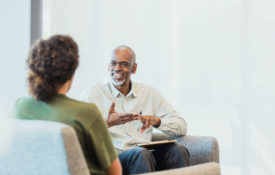-
It’s Gotten Awkward to Wear a Mask
Last week, just a couple of hours into a house-sitting stint in Massachusetts for my cousin and his wife, I received from them a flummoxed text: “Dude,” it read. “We are the only people in masks.” Upon arriving at the airport, and then boarding their flight, they’d been shocked to find themselves virtually alone in wearing masks of any kind. On another trip they’d taken to Hawaii in July, they told me, long after coverings became optional on planes, some 80 percent of people on their flight had been masking up. This time, though?
-
Personalities Don’t Usually Change Quickly but They May Have During the Pandemic
The global coronavirus pandemic disrupted almost everything about our lives, from how we work and go to school, to how we socialize (Zoom happy hours, anyone?!), and ultimately strained trust in many of the overarching systems we depend on, from health care to government. New research suggests it may have changed Americans' personalities, too, and not for the better. Typically, major personality traits remain fairly stable throughout life, with most change happening in young adulthood or when stressful personal life events occur.
-

Patients Believe in Psychotherapy More When Practitioners Demonstrate Warmth and Competence
Therapists high in competence and warmth may also boost patients’ willingness to continue treatment and even improve clinical outcomes.
-

Apply for a National Science Foundation Postdoctoral Research Fellowship
The goal of the fellowship is to provide advanced training and experience to early-career scientists, broaden participation of underrepresented groups in science, prepare doctoral level scientists for future careers, and assist new scientists in directing research efforts across disciplinary lines and national boundaries.
-

Can Shifting Social Norms Help Mitigate Climate Change?
An interdisciplinary team of researchers reports on how social norms can be harnessed to bring about collective climate action and policy change.
-
6 Ways You’re Thinking Wrong–and What You Can Do About Them
WHEN I WAS a graduate student at the University of Illinois at Urbana-Champaign, doing research in cognitive psychology, our lab group went out every now and then for nachos and beers. It was a great opportunity for us to ask our adviser about things that wouldn't likely come up in our more formal meetings.

